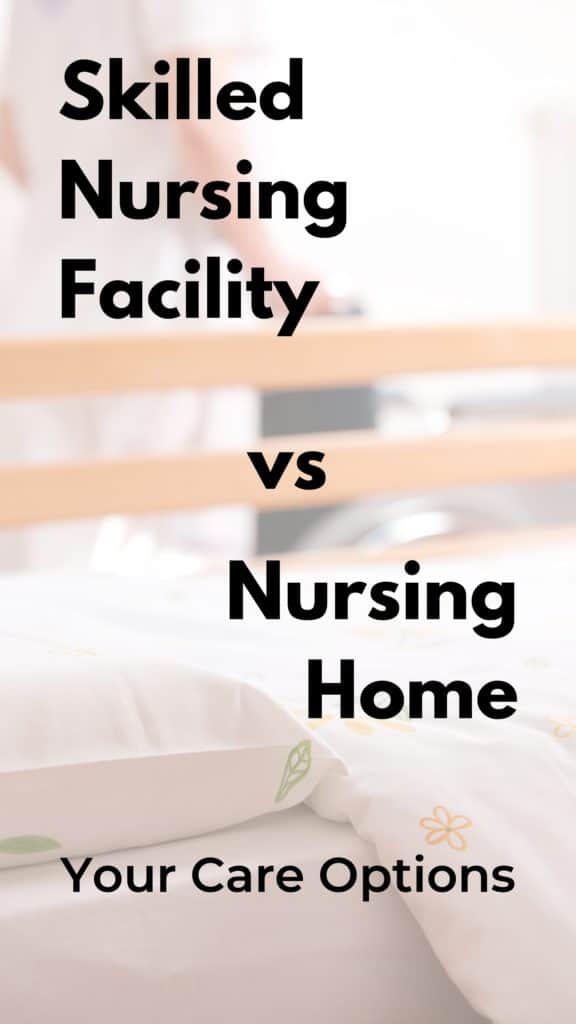Skilled Nursing Facility vs Nursing Home: The Difference Between Care Options
Unsure about the difference between skilled nursing facilities and nursing homes. Many people use the terms interchangeably, but they’re actually two very different types of care.
Skilled nursing facilities are for patients who require active rehabilitation, while nursing homes are for residents who need long term care.

This post is for general informational and educational purposes only. You can read the full disclaimer for more information.
In this blog post, we will explore the differences between these two types of care in more detail.
What is a skilled nursing facility?
Skilled nursing facilities (SNFs) are places in which residents can receive care from licensed professionals. These facilities are typically staffed by nurses, physical therapists, occupational therapists, and social workers.
Patients in skilled nursing facilities often require short term care after being discharged from the hospital. They may also need care in a rehabilitation center to recover from an injury or illness.
Additionally, skilled nursing facilities typically have a staff of nurses and other medical professionals on site 24 hours a day, which can be beneficial for residents who have an exacerbation of chronic conditions.
The main benefit of skilled nursing facilities is that they provide a higher levels of care than most other types of senior living communities. Skilled nursing facilities are designed to meet the medical needs of residents who require IV therapy, wound care, new tracheostomy care, speech therapy, and physical and occupational therapy.
Skilled nursing facilities can also provide social and recreational activities, as well as help with activities of daily living, such as bathing, dressing, and eating.
There are many different types of skilled nursing facilities, and the level of care they provide can vary. Some skilled nursing facilities offer basic medical services such as wound care and physical therapy. Others may provide more specialized type of care, such as for those with Alzheimer’s disease or other forms of dementia.

The staff at skilled nursing facilities is typically very experienced and can provide residents with the care they need to recover from an illness or injury. If you or a loved one is in need of short-term care after a hospital stay, skilled nursing facilities may be a good option.
What is a nursing home?
Nursing homes are places in which residents can receive long-term care, either because independent living is unsafe or because they require more care than can be provided at home or by family members.
Nursing homes provide a variety of services, including 24-hour supervision, meal preparation, personal care, transportation to doctor’s appointments, recreation and other outings. Residents typically have a private or semiprivate room and share a bathroom with one or two other residents.
Nursing homes are regulated by state and federal laws, which set standards for the quality of care that nursing homes must provide. These laws also establish guidelines for the admission and discharge of residents, as well as for resident rights.
Nursing home staff members include registered nurses (RNs), licensed practical nurses (LPNs), nurse aides, social workers, and activity coordinators. The RN is the staff member with the most clinical responsibility for residents’ care.
Nursing homes are an important part of the continuum of long-term care services in the United States. More than two million Americans live in nursing homes, and millions more receive care in other types of long-term care facilities, such as assisted living facilities or assisted living communities, home health agencies, and hospices.
The difference between a skilled nursing facility and a nursing home

Skilled nursing facilities are an intermediate level of long-term care between nursing homes and hospitals. SNFs provide skilled nursing care and rehabilitative care to residents who need more medical attention than can be provided at home or in an assisted living facility, but who do not require the intensive medical care that is available only in a hospital.
The care provided in skilled nursing facilities is much more comprehensive than the care typically provided in nursing homes. In addition to the services provided by nursing homes, skilled nursing facilities also have physical and occupational therapies, staff speech therapists, provide wound care, IV therapy, and other types of rehabilitation services.
One of the biggest differences between skilled nursing facilities and nursing homes is the type of staff that is employed. Skilled nursing facilities have a higher ratio of registered nurses (RNs) to residents than nursing homes.
In addition, skilled nursing facility staff members are required to have more training and experience than those who work in nursing homes.
Skilled nursing facility cost
The cost of skilled care services varies widely, with some states spending far less than others. Texas has the lowest median price of skilled nursing services in the United States at $4,950 per month for a semi-private room.
Alaska has the highest median cost in the United States at $36,900 per month for the same level of care. (source)
Assuming you stay in a private room, a skilled nursing facility will cost around $275 per day, $7650 per month, and $93,075 each year. (source)
Medicare Part A or hospital coverage will assume some of the cost for skilled services. This is providing that a doctor states it is warranted, time exists in the benefit period, and the patient meets additional eligibility requirements.
Medicaid may also provide assistance in covering skilled nursing facility cost, although their contribution is state dependent.

Nursing home cost
There is also a wide range of nursing home costs in the United States. Texas has the lowest annual cost at $61,503 for a semi-private room. Alaska has the highest annual cost at $378,140 for the same accommodations. (source)
Nationally, a nursing home stay, in a semi private room cost $94,900 and a private room cost $108,405. (source)
Medicare doesn’t reimburse anything toward long-term care. If you need rehabilitative services or physical therapy following an accident or illness, you can use Medicare benefits to pay for short-term stays in a nursing home of up to 100 days.
Individuals can get help paying for nursing home care through Medicaid services. However, they must be able to financially qualify for assistance in order to receive it.
Skilled nursing facility vs nursing home for your loved one
If you are considering a skilled nursing facility for your loved one, you should take the time to learn more about the facility and the services that they offer. You should also talk to your loved one’s doctor to see if this is the right option for them.
Or if you are considering a nursing home for your loved one, it is important to choose a facility that provides high-quality care and meets your individual needs. To find out more about nursing homes in your area, contact your local Area Agency on Aging.
The Area Agency on Aging can provide you with information about nursing homes in your area, as well as other long-term care options for older adults. They can also help you understand the different types of Medicaid and Medicare coverage available to pay for nursing home care.
Skilled nursing rn job description
The registered nurse in a skilled nursing facility job description generally entails providing direct patient care, as well as supervising the care given by licensed practical nurses and certified nursing assistants (CNAs). RNs also develop and implement patient care plans, coordinate care with other members of the healthcare team, and provide patient education.
In addition to the above-mentioned duties, skilled nurses or RNs in SNFs may also be responsible for medication management, wound care, and other aspects of nursing care. They may also be involved in quality improvement initiatives and infection control programs.
The specific duties of an RN in a skilled nursing facility will vary depending on the size and type of facility, as well as the RN’s level of experience.
If you are interested in becoming an RN in a skilled nursing facility, it is important to have a strong foundation in nursing care. You should also be able to work independently and be comfortable working with patients of all ages. If you have these qualities, then a career in a SNF may be right for you.

Skilled nursing facility vs nursing home takeaways
You may have heard the terms skilled nursing facility and nursing home used interchangeably, but there are key differences between the two. A nursing home is for people who need long-term round-the-clock care, while a skilled nursing facility offers short-term rehabilitation services after an illness or surgery.
In either case, nurses and other healthcare professionals work around the clock to help residents with their daily needs, from bathing and dressing to eating and taking medication. These facilities offer 24/7 care in a safe and comfortable setting.
Knowing the difference between these two types of facilities is important. So you can be sure you are making the best placement decision for your loved one or career move for yourself.







